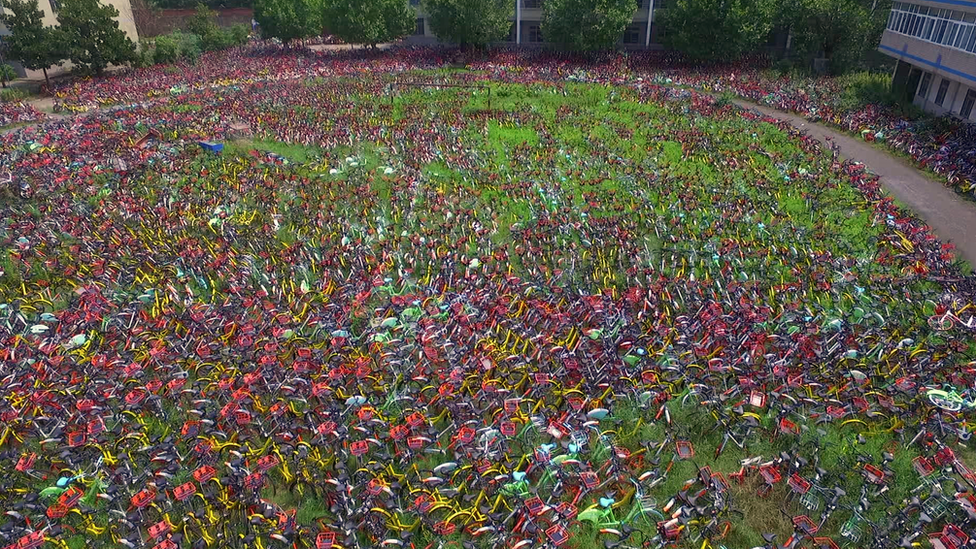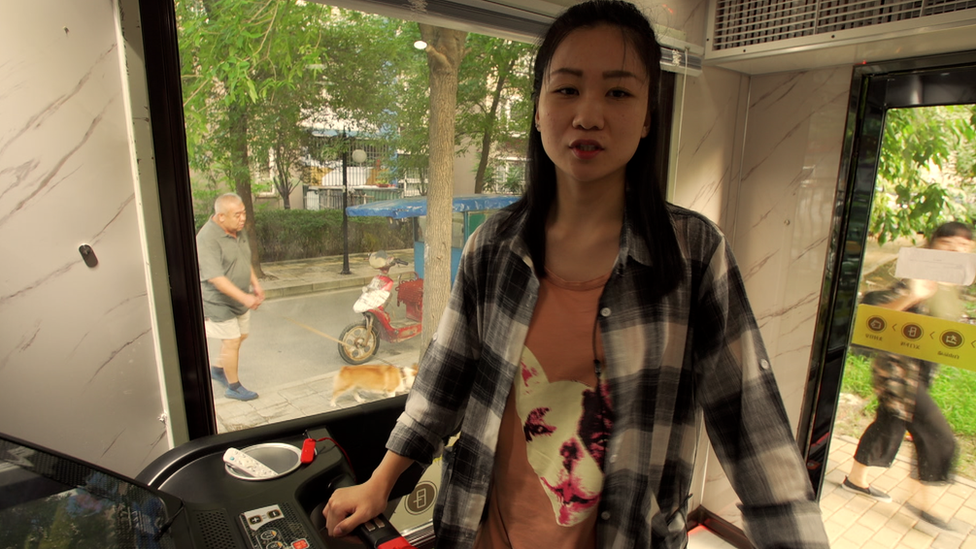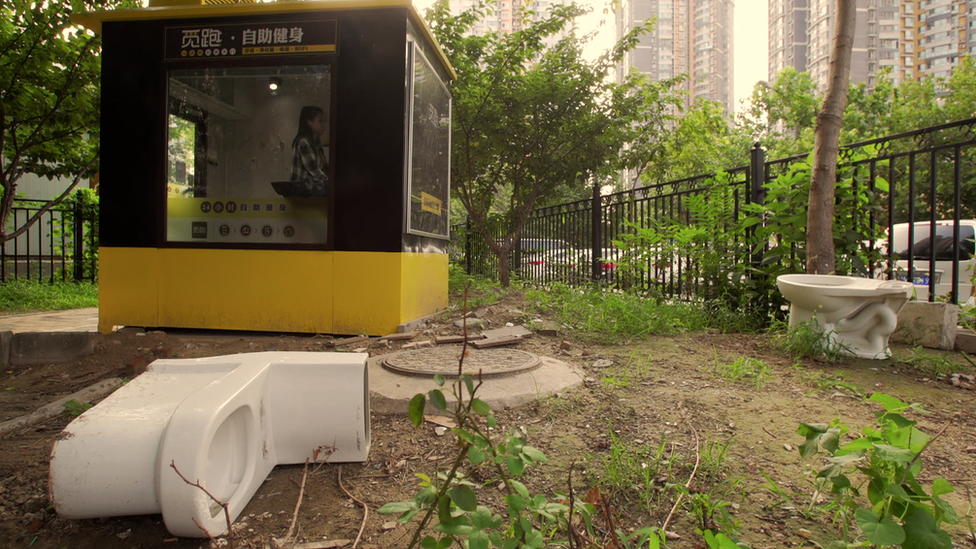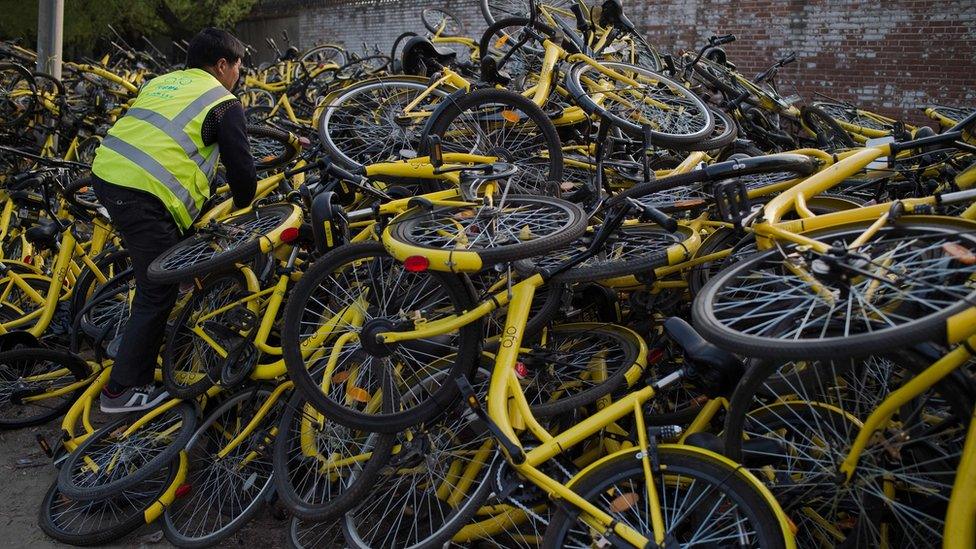What's yours is mine in China but is sharing at a peak?
- Published
From footballs to gym pods, what China's economy lets you share
Ok, so car sharing makes perfect sense. And we get bike sharing, too. But ball sharing?
At a sports complex in Beijing, Wang Hui En scans a code on a locker with his smartphone.
The door clicks open and out pops a basketball, yours to use there and then for a rental fee of $0.30 (23p) or so per hour.
Mr Wang is chief executive of One Tiyu, which translates as One Sports, and he has plans to quite literally roll out 20 million soccer and basketballs across China.
"The sharing economy is indeed very hot right now," he tells me.

Wang Hui En wants to spread a sharing scheme for basketballs and footballs across China
"But we're not trying to hijack the term. We just want to provide the best experience for our customers," he says.
The sharing craze
China has embraced mobile phone based payment technology like nowhere else on the planet and it has led to the spectacular take-off of the so-called "sharing" economy.
Some of it involves genuine peer to peer sharing schemes, like matching drivers with unused capacity in their cars to passengers going the same way.
Others are more properly viewed as hi-tech rental schemes, in which products like bikes, taxi rides or balls are matched to customers, and millions of small payments are aggregated into large revenue streams.
So hot is the sector in China right now, and so rapid is the growth, that it is drawing in billions of dollars of venture capital funding.

If you illegally park your bicycle in China's Hefei, it's likely to be impounded here
But all new business models bring with them new challenges and this one is no different.
The downsides
An umbrella sharing scheme recently ran into difficulty after 300,000 'brollies reportedly went missing., external
A sleep sharing scheme, in which people were able to rent time in sleeping pods for daytime naps has fallen foul of China's hotel regulations and has been closed down, at least for now.
Even bike sharing, a runaway success in terms of the numbers of users, has faced some of the same problems - from theft, vandalism and a less than wholehearted welcome from the authorities.
The sight of many thousands of bikes, impounded in a large field for being illegally parked in the city of Hefei, is a stark visual reminder that the success of such schemes depends on a lot more than just signing up enough customers.
But despite the downsides the revolutionary potential of these innovations remains strong.

Li Xiaoqun is a fan of China's sharing economy
It is the mobile tracking technology that allows China's new generation of shared bikes to be left anywhere - rather than only at docking stations.
While hundreds of thousands of bikes seemingly airdropped and scattered at random might upset the odd local official or two - the figures speak for themselves in terms of the popularity of the schemes.
In some Chinese cities, the explosion of bike sharing has, in the space of just a year or so, been responsible for a doubling in the number of cyclists., external
'Revolutionary potential'
Karl Fyellstrom, an urban transport consultant with Far East BRT based in the city of Guangzhou, argues that the new businesses have done more for cycling, almost overnight, than decades of campaigning ever did.
"I've been promoting cycling for ten years, not just in China but around the world, and it's hard," he tells me.
"And then this bike sharing came along and it's just revolutionary. I see this as really historic opportunity."
In the grounds of a residential tower block, rather unflatteringly surrounded by some discarded toilets left over from a bathroom refit, Li Xiaoqun is running on a treadmill.

The gym pods aren't your average health club
It's another iteration of the sharing craze and Ms Li is trying a gym pod for the first time.
The small box-like room leaves much to be desired when compared to your average health club - not least showers and a changing room.
But at $2 an hour Ms Li seems impressed.
"People like these shared ideas," she says.
"We hope to see more shared things, they are nice surprises. We all hope the sharing schemes can develop well."
- Published18 August 2017

- Published12 August 2016

- Published21 June 2017

- Published27 January 2017